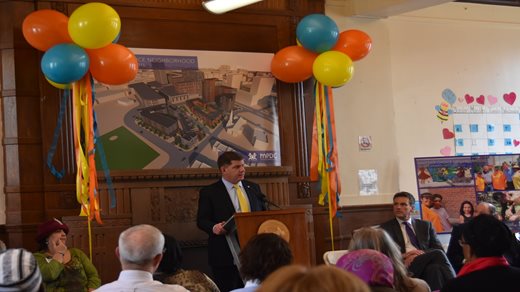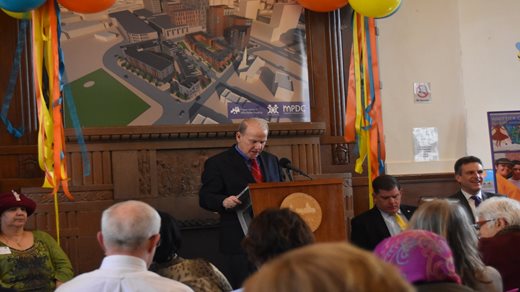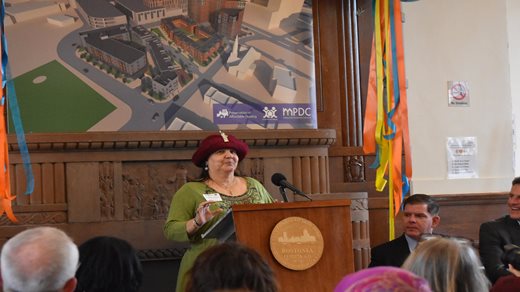BOSTON – Tuesday, February 27, 2018 - Mayor Martin J. Walsh today broke ground on phase one of a comprehensive redevelopment of the Whittier Street public housing development in Roxbury that was first built in 1953. The project will rebuild and preserve 200 existing public housing apartments by replacing them on- and off-site with an expanded program of 509 units of mixed-income rental housing and 14,225 square feet of commercial space.
“As we shape Boston's growth, we must make sure our progress benefits everyone, especially long-term residents of the City," said Mayor Walsh. "I'm incredibly proud of the dedication of our partners who have come together to create a brighter future for the residents of Whittier Street and the surrounding neighborhood."
The redevelopment is made possible by a $30 million federal Choice Neighborhoods Initiative grant to the Boston Housing Authority and City of Boston’s Department of Neighborhood Development that will leverage an additional $260 million in private and public funds for commercial and residential development and public facilities in the Whittier neighborhood.
Demolition of 68 apartments will start at the back of the Whittier Street property to make way for 168 new apartments, both on-site and off-site. Phase 1A will create 92 mixed-income apartments in three new structures on site that will include a management office, a community room, and outdoor recreational space. Phase 1B will create 76 additional new mixed-income apartments on parcels nearby in Madison Park Village. The new phase one units will be completed by summer 2019. The entire Whittier redevelopment will be completed by 2021.
"This grant helps us to continue our commitment of providing healthy, safe, and accessible affordable housing to the residents that live within the Whittier corridor," said BHA Administrator Bill McGonagle. "Every family in public housing deserves access, opportunity and the chance to strive for excellence. We believe this grant allows for these things to take place."
“I’ve lived in this development since 1964, and it is an honor that we were chosen for redevelopment,” said resident, and Task Force President, Stephanie Thomas. “These changes will definitely be an adjustment, but I am looking forward to new beginnings.”
Residents who need to relocate temporarily may move to other BHA public housing or may opt to accept mobile Housing Choice Vouchers. All original Whittier public housing residents will be offered the opportunity to return to the transformed Whittier community when construction is complete.
Madison Melnea Cass Apartments consists of a new 4-story, 16 unit building at 40 Raynor Circle and a new a 5-story, 60 unit building at Melnea Cass Boulevard and Brook Marshall Road, an addition of 53 new mixed income rental homes for low and moderate income families.
"This housing is part of the first phase of an ambitious Whittier Housing Neighborhood Transformation Plan," said Madison Park Development Corporation's Chief Executive Officer Jeanne Pinado. "It will provide new homes for a broad range of low and moderate income families and create a new edge to Melnea Cass Boulevard, making it safer and more pedestrian-friendly."
The Whittier Street housing development is part of the larger neighborhood of Roxbury, with an area of roughly one square mile and 2,418 households. Built in 1953, Whittier Street is over 60 years old, and the HUD Choice Neighborhood grant will allow the property to be updated to fit with the current mixed-use neighborhood.
HUD created the Choice Neighborhoods Initiative to transform neighborhoods and link housing improvements with appropriate services, schools, public assets, transportation and access to jobs. In 2011, Boston was one of just five cities nationwide to receive one of the first-ever HUD Choice Neighborhoods Initiative Implementation grants. The Whittier Street grant marks Boston's second Choice Neighborhoods grant.
The Whittier Choice partnership is led by the Boston Housing Authority, the City of Boston, the Whittier Street Tenant Task Force, Preservation of Affordable Housing, Madison Park Development Corporation, and Economic Mobility Pathways (EMPath). The grant incorporates strategies for Neighborhood, Housing and People as a way to provide a coordinated transformation for the community in and around the original housing development footprint.
-
The Neighborhood Strategy seeks to break down barriers that isolate residents, to promote physical and social connections, and to link the neighborhood to the regional economy. There is a priority focus on improving public safety and creating safer, livelier streets, including a vibrant pedestrian corridor along Ruggles Street.
-
The Housing Strategy aims to preserve affordability while creating a better balance of housing options in the neighborhood. This plan creates a livable site with outdoor play spaces, a mix of building types to accommodate diverse family needs, and new through-streets to re-integrate the site into the broader neighborhood.
-
The People Strategy addresses a range of priority needs: income and asset building, health, education and youth development. At the center, EMPath will provide case management through its intensive Mobility Mentoring™ model. Boston Housing Authority (BHA), in partnership with EMPath and Dudley Street Neighborhood Initiative, the City’s Promise Neighborhood grantee, as well as service providers, relocation counselors, property management staff, and resident leaders will connect residents to existing services and newly leveraged programs.
About Boston Housing Authority (BHA)
Boston Housing Authority (BHA) provides affordable housing to more than 58,000 residents in and around the City of Boston. Residents are assisted through a combination of public housing and federal and state voucher subsidy programs that provide a wide variety of housing opportunities. As the largest public housing authority in New England, the BHA houses close to 9 percent of the city's residents. Our mission is to provide stable, quality affordable housing for low and moderate income persons; to deliver these services with integrity and mutual accountability; and to create living environments which serve as catalysts for the transformation from dependency to economic self-sufficiency.



.JPG.aspx?width=520&height=292)
